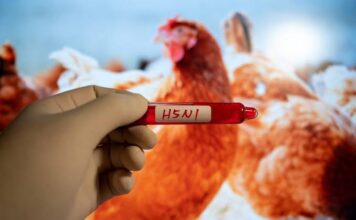A Mexican individual passed away from avian flu in the initial verified instance of a person being infected with the H5N2 strain, as reported by the World Health Organization (WHO) on Wednesday.
The 59-year-old man, who succumbed on April 24 after experiencing symptoms including fever, difficulty breathing, diarrhea, and nausea,no history of exposure to poultry or other animals” and “multiple underlying medical conditions,” the WHO said in a statement.
A person from the State of Mexico was admitted to a hospital in Mexico City, but unfortunately, they passed away on the same day .
It was the “first laboratory-confirmed human case of infection with an influenza A(H5N2) virus reported globally”, the WHO noted.
On May 23, Mexican health officials reported a confirmed case of H5N2 avian influenza in a human to the World Health Organization (WHO) after conducting laboratory tests; however, the origin of exposure to the virus remained unknown, although there have been previous reports of H5N2 in poultry in Mexico .
However, it was stated that up to that point, it had been impossible to establish a connection between the human case and the poultry infections, with the risk to individuals being estimated as “low.”
The Mexico’s health ministry stated in a release that the deceased individual was,“a 59-year-old man with a history of chronic kidney disease, type 2 diabetes, (and) long-standing systemic arterial hypertension.
“There is no risk of contagion for the population,” the statement said, adding that “all samples from identified contacts (of the patient) have been negative.”
Officials are keeping an eye on farms close to the victim’s residence and have set up a continuous monitoring system to identify any other instances of wildlife in the vicinity, as stated.
Another form of avian flu, namely H5N1, has been circulating among dairy cow herds in the US for several weeks, with a few cases recorded among individuals.
However, authorities emphasize that none of the cases involve human-to-human transmission, with the infection instead being transmitted from cattle to humans.
